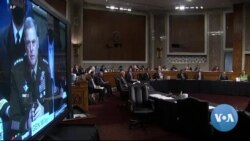ເຈົ້າໜ້າທີ່ທະຫານລະດັບສູງຂອງອາເມຣິກາໄດ້ບັນລະຍາຍກ່ຽວກັບການຍົກຍ້າຍ ທີ່ເກີດຂຶ້ນຢູ່ໃນອັຟການິສຖານວ່າ ເປັນ “ຂັ້ນຕອນການຍົກຍ້າຍທີ່ປະ ສົບຜົນສໍາເລັດ ແຕ່ແມ່ນຄວາມລົ້ມແຫຼວທາງດ້ານຍຸດທະສາດ.” ນາຍພົນ ມາກ ມີລລີ (Mark Milley) ປະທານເສນາທິການຮ່ວມ, ກ່າວໃນລະຫວ່າງການຮັບຟັງຄໍາໃຫ້ການຕໍ່ສະພາສູງ ກ່ຽວກັບການຖອນກໍາລັງທະຫານ ແລະການຍົກຍ້າຍຜູ້ຄົນອອກຈາກອັຟການິສຖານຂອງສະຫະລັດ. ຄາຣ໌ລາ ບາບ (Carla Babb), ນັກຂ່າວຂອງ VOA ປະຈໍາທໍານຽບ 5 ແຈ ມີລາຍງານ, ເຊິ່ງ ທິບສຸດາ ຈະນໍາເອົາລາຍລະອຽດ ມາສະເໜີທ່ານໃນອັນດັບຕໍ່ໄປ.
ນາຍພົນລະດັບສູງສຸດຂອງສະຫະລັດ ກ່າວເຖິງພາລະກິດໃນການຍົກຍ້າຍຢູ່ອັຟການິສຖານໃນການຊັ່ງຊາແບບກົງໄປກົງມາ ຊຶ່ງທ່ານນາຍພົນມາກ ມີລລີ, ປະ ທານເສນາທິການຮ່ວມສູງສຸດກ່າວວ່າ:
“ຂັ້ນຕອນການຍົກຍ້າຍແມ່ນປະສົບຜົນສໍາເລັດ ແຕ່ທາງດ້ານຍຸດທະສາດແມ່ນລົ້ມແຫຼວ.”
ແລະສຳລັບການສະຫຼຸບ ໃນການສິ້ນສຸດຂອງສົງຄາມໂດຍລວມນັ້ນ ທ່ານມາກ ມີລລີ ກ່າວວ່າ:
“ຜົນທີ່ອອກມາຄືຄວາມລົ້ມແຫຼວທາງດ້ານຍຸດທະສາດ. ຝ່າຍສັດຕູໄດ້ຢຶດຄອງນະຄອນຫຼວງກາບູລ. ມັນບໍ່ມີທາງອື່ນແລ້ວທີ່ຈະອະທິບາຍສິ່ງດັ່ງກ່າວ, ນັ້ນຄືຜົນທີ່ເກີດຂຶ້ນ ອັນໄດ້ສະສົມມາເປັນເວລາ 20 ປີ, ບໍ່ແມ່ນ 20 ມ້ື.”
ທ່ານນາຍພົນມີລລີ ພ້ອມດ້ວຍຜູ້ບັນຊາການ ກຳລັງສະຫະລັດໃນພາກຕາເວັນອອກກາງ ນາຍພົນແຟຣງ ແມັກເຄັນຊີ (Frank Mckenzie) ກ່າວວ່າ ພວກທ່ານເອງມີຄວາມຄິດຢາກຈະໃຫ້ມີທະຫານຢ່າງໜ້ອຍ 2,500 ຄົນຍັງຄົງປະຕິ ບັດງານຢູ່ທີ່ນັ້ນ ທ່ານນາຍພົນມາກ ມີລລີ ກ່າວວ່າ:
“ຕາມການປະເມີນຂອງຂ້າພະເຈົ້າກັບຄືນໄປໃນລະດູໃບໄມ້ຫຼົ່ນຂອງປີ 2020 ແລະຍັງຄົງຄວາມສະໝໍ່າສະເໝີຕະຫຼອດມາ. ພວກເຮົາຕ້ອງຮັກສາລະດັບ 2,500 ຄົນໃຫ້ຢູ່ຄົງທີ່ ແລະອາດຈະເພີ້ມຂຶ້ນຮອດ 3,500 ຄົນ, ບາງທີ ບາງຢ່າງປະມານນັ້ນ, ເພື່ອຈະກ້າວໄປສູ່ການແກ້ໄຂດ້ວຍການເຈລະຈາຕົກລົງກັນ.”
ນາຍພົນແຟຣງ ແມັກເຄັນຊີ ຜູ້ບັນຊາການກຳລັງສະຫະລັດ ໃນພາກຕາເວັນອອກກາງຫຼື CENTCOM ກ່າວວ່າ:
“ຂ້າພະເຈົ້າໄດ້ແນະນໍາວ່າ ພວກເຮົາຄວນມີກອງທະຫານ 2,500 ຄົນຢູ່ໃນອັຟການິສຖານ. ແລະຂ້າພະເຈົ້າຍັງໄດ້ແນະນໍາ ໃນຊ່ວງຕົ້ນລະດູໃບໄມ້ຫຼົ່ນຂອງປີ 2020 ວ່າ ພວກເຮົາຈະຕ້ອງມີທະຫານໄວ້ 4,500 ຄົນໃນເວລານັ້ນ. ນັ້ນແມ່ນຄວາມຄິດເຫັນສ່ວນໂຕຂອງຂ້າພະເຈົ້າ. ຂ້າພະເຈົ້າຍັງເຄີຍມີຄວາມຄິດເຫັນວ່າ ການຖອນກອງກໍາລັງ ອອກຈາກອັຟການິສຖານ ຈະນໍາໄປສູ່ ການຫຼົ້ມສະຫຼາຍຂອງກອງກໍາລັງອັຟການິສຖານຢ່າງຫຼີກລ້ຽງບໍ່ໄດ້ ແລະໃນທີ່ສຸດກໍ່ນໍາໄປສູ່ການຫຼົ້ມສະຫຼາຍຂອງລັດຖະບານອັຟການິສຖານ.”
ຄໍາຢືນຢັນຕ່າງໆຂອງທ່ານນາຍພົນທັງສອງ ແມ່ນແຕກຕ່າງກັນກັບຄໍາກ່າວປາໄສຂອງທ່ານໂຈ ໄບເດັນ, ຜູ້ທີ່ກ່າວວ່າ ທ່ານເອງຈື່ບໍ່ໄດ້ວ່າທີ່ປຶກສາຂອງທ່ານຄົນໃດແນະນໍາທ່ານ ໃຫ້ຮັກສາກອງກໍາລັງທະຫານຈຸນ້ອຍໆຈຳນວນນຶ່ງ ໄວ້ຢູ່ໃນອັຟການິສຖານ.
ທໍານຽບຂາວໄດ້ກ່າວປົກປ້ອງການຕັດສິນໃຈ ໃນການຖອນກໍາລັງອອກທັງໝົດອີກຄັ້ງ ໃນມື້ວັນອັງຄານທີ່ຜ່ານມາ.
ທ່ານນາງເຈັນ ຊາກີ, ໂຄສົກປະຈໍາທໍານຽບຂາວກ່າວວ່າ:
“ຖ້າພວກເຮົາຈົ່ງກອງກໍາລັງທະຫານ 2,500 ຄົນຢູ່ທີ່ນັ້ນ, ພວກເຮົາຈະຕ້ອງເພີ້ມຈໍານວນທະຫານຂຶ້ນອີກ, ພວກເຮົາອາດຈະຕ້ອງໄດ້ເຮັດສົງຄາມ ກັບກຸ່ມ ຕາລິບານ, ພວກເຮົາຈະຕ້ອງມີຄົນອາເມຣິກັນບາດເຈັບລົ້ມຕາຍຫຼາຍຂຶ້ນ. ນັ້ນ ຄືຄວາມເປັນຈິງ ທີ່ທຸກໆຄົນສາມາດເຫັນໄດ້ ກ່ຽວກັບສິ່ງດັ່ງກ່າວ.”
ທັງພັກຣີພັບບຣິກັນ ແລະເດໂມແຄຣັດຕ່າງກໍ່ພາກັນສະແດງຄວາມບໍ່ພໍໃຈທີ່ລັດ ຖະບານໄດ້ປະພົນລະເຮືອນຊາວອາເມຣິກັນ ແລະພັນທະມິດອັຟການິສຖານໄວ້ຂ້າງຫຼັງ ຫຼັງຈາກທີ່ປະທານາທິບໍດີກ່າວວ່າ ທ່ານຈະບໍ່ເຮັດແນວນັ້ນ.
ພວກເຂົາເຈົ້າຍັງໄດ້ຖາມເຖິງການເຮັດສົງຄາມຕໍ່ຕ້ານພວກກໍ່ການຮ້າຍໃນອະນາ ຄົດ.
ສະມາຊິກສະພາສູງທ່ານ ໂຈນີ ເອີຣສທ໌ (Joni Ernst), ຈາກພັກຣີພັບບຣີກັນ ຖາມວ່າ:
ພາລະກິດຂອງກອງທັບ ໃນການເອົາຊະນະໄພຂົ່ມຂູ່ຈາກອັຟການິສຖານ ມີຄວາມຍາກຂຶ້ນບໍ?
ເຊິ່ງນາຍພົນ ມີລລີ ຕອບວ່າ:
“ແມ່ນແລ້ວ.”
ໂດຍສະມາຊິກສະພາສູງທ່ານ ໂຈນີ ເອີຣສທ໌ ຖາມຕໍ່ວ່າ:
ໃນເວລານີ້, ກຸ່ມຕາລິບານ ແລະບັນດາພັນທະມິດກໍ່ການຮ້າຍຂອງພວກເຂົາ ມີຄວາມສາມາດໃນການຝຶກອົບຮົມ ແລະກຽມພ້ອມ ຢູ່ໃນອັຟການິສຖານຫຼາຍຂຶ້ນໃນຂະນະທີ່ພວກເຮົາໄດ້ຖອນໂຕອອກມາ ຫຼືບໍ່?
ທ່ານນາຍພົນມີລລີ ຕອບວ່າ:
“ແມ່ນແລ້ວ.”
ສະມາຊິກສະພາສູງທ່ານ ມາກ ເຄລລີ (Mark Kelly), ຈາກພັກເດໂມແຄຣັດ ຖາມວ່າ:
ທ່ານມີຄວາມໝັ້ນໃຈບໍ ວ່າພວກເຮົາສາມາດປະຕິເສດບໍ່ໃຫ້ອົງການຕ່າງໆເຊັ່ນ ອາລ-ກາອີດາ ແລະໄອຊິສ (ISIS) ສາມາດໃຊ້ປະເທດອັຟການິສຖານ ເປັນແປ້ນຢັນ ໃນການປະຕິບັດງານກໍ່ການຮ້າຍຂອງພວກເຂົາ?
ເຊິ່ງພົນເອກແຟຣງ ແມັກເຄັນຊີ ກ່າວວ່າ:
“ຂ້າພະເຈົ້າຄິດວ່າ ຖ້າເບິ່ງຕໍ່ໄປ.”
ທາງກອງທັບໄດ້ຖືກຕ້ອງຕິຢ່າງຮຸນແຮງໃນການໂຈມຕີໂດຍເຮືອບິນບໍ່ມີຄົນຂັບ ຫລືໂດຣນທີ່ຜິດພາດ ໃນຊ່ວງໄລຍະສຸດທ້າຍຂອງການຖອນໂຕອອກຈາກອັຟການິສຖານ ອັນໄດ້ສັງຫານພົນລະເຮືອນໄປ 10 ຄົນ, ເຊິ່ງພົນເອກ ແມັກເຄັນຊີ ໄດ້ຮັບຜິດຊອບໃນການໂຈມຕີດັ່ງກ່າວ.
ເຈົ້າໜ້າທີ່ລະດັບສູງຂອງກະຊວງປ້ອງກັນປະເທດຍັງໄດ້ເນັ້ນຢໍ້າວ່າ ໜ່ວຍຂ່າວກອງຂອງສະຫະລັດ ໄດ້ປະສົບກັບຄວາມລົ້ມແຫຼວ ໃນການຄາດຄະເນລ່ວງໜ້າກ່ຽວກັບການພັງທະລາຍລົງຢ່າງໄວວາຂອງນະຄອນຫຼວງກາບູລ.
ທ່ານນາຍພົນມາກ ມີລລີ, ປະທານເສນາທິການຮ່ວມກ່າວວ່າ:
“ຂ້າພະເຈົ້າຢາກຈະແນະນໍາໃຫ້ຜູ້ນໍາທຸກຄົນວ່າ ຢ່າກໍານົດວັນທີທີ່ແນ່ນອນ ຫຼືວັນສຸດທ້າຍ. ປະຕິບັດສິ່ງຕ່າງໆຕາມເງື່ອນໄຂຂັ້ນພື້ນຖານ ແລະປະທານາທິບໍດີທັງສອງຄົນ ທັງທ່ານທຣໍາ ແລະທ່ານໄບເດັນ ໄດ້ກຳນົດວັນເວລາໃນນັ້ນ.”
ແລະກ່ຽວກັບຜູ້ນຳທີ່ຖືກຂັບໄລ່ຂອງອັຟການິສຖານ ທ່ານອາສຣາຟ ການີນັ້ນ.
ນາຍພົນແຟຣງ ແມັກເຄັນຊີ ກ່າວວ່າ:
“ເມື່ອປະທານາທິບໍດີຂອງພວກເຈົ້າຫຼົບໜີໄປຢ່າງໄວວາໃນລະຫວ່າງການສູ້ລົບເພື່ອຍາດແຍ່ງນະຄອນຫຼວງຢູ່ນັ້ນ, ຂ້າພະເຈົ້າຄິດວ່າ ບໍ່ມີໂອກາດເລີຍ ທີ່ຈະຕ້ານທານໄວ້ໄດ້.”
America’s top military officer has described the Afghanistan evacuation as “a logistical success but a strategic failure.” General Mark Milley, the chairman of the Joint Chiefs of Staff, spoke at a contentious Senate hearing on the U.S. military's withdrawal and evacuation from Afghanistan. VOA Pentagon correspondent Carla Babb has the details.
The top U.S. general Tuesday bluntly assessing the Afghanistan evacuation mission …
((Gen. Mark Milley, Chairman of the Joint Chiefs of Staff))
“It was a logistical success but a strategic failure.”
… and the overall end of the war.
((Gen. Mark Milley, Chairman of the Joint Chiefs of Staff))
“An outcome that is a strategic failure. The enemy is in charge of Kabul. There’s no way else to describe that — that is a cumulative effect of 20 years, not 20 days.”
Milley, along with Central Command chief Gen. Frank McKenzie, said they personally had wanted a minimum of 2,500 troops to remain.
((Gen. Mark Milley, Chairman of the Joint Chiefs of Staff))
“My assessment was back in the fall of ‘20 and remained consistent throughout. We should keep a steady state of 2,500, and it could bounce up to 3,500, maybe something like that, in order to move toward a negotiated solution.”
((Gen. Frank McKenzie, US CENTCOM Commander))
“I recommended that we maintain 2,500 troops in Afghanistan. And I also recommended earlier in the fall of 2020 that we will maintain 4,500 at that time. Those are my personal views. I also had a view that withdrawal of those forces would lead inevitably to the collapse of the Afghan military forces and eventually the Afghan government.”
The generals’ assertions contrasted with those of President Joe Biden, who has said he did not recall any of his advisers urging him to keep a small U.S. military force in Afghanistan.
The White House Tuesday again defending the decision to remove all troops.
((Jen Psaki, White House Press Secretary))
“If we had kept 2,500 troops there, we would have increased the number of troops, we would have been at war with the Taliban, we would have had more U.S. casualties. That was a reality everybody was clear-eyed about.”
Both Republicans and Democrats slammed the administration for leaving Americans and Afghan allies behind after the president said he would not do so.
They also asked pointed questions on the future of the counterterror war there.
((Sen. Joni Ernst, Republican))
Has the military's task to defeat terror threats from Afghanistan gotten harder?
Milley: Yes.
((Sen. Joni Ernst, Republican))
Does the Taliban and its other terror partners have more ability to train and prepare in Afghanistan now that we've left?
Milley: Yes.
((Sen. Mark Kelly, Democrat))
"Are you confident that we can deny organizations like al-Qaida and ISIS the ability to use Afghanistan as a launchpad for terrorist activity?"
((Gen. Frank McKenzie, US CENTCOM Commander))
"I think that's yet to be seen."
The military has come under harsh criticism for its errant drone strike in the final days of the withdrawal that killed 10 civilians, a strike for which McKenzie has taken responsibility.
The top defense officials also reiterated that U.S. intelligence had failed to anticipate the rapid fall of Kabul.
But in their lessons learned, they had a message for America's civilian leaders.
((Gen. Mark Milley, Chairman of the Joint Chiefs of Staff))
“I would advise any leader: Don't put date-certains or end dates. Make things conditions-based, and two presidents in a row [Trump and Biden] put dates on it."
…and ousted Afghan leader Ashraf Ghani.
((Gen. Frank McKenzie, US CENTCOM Commander))
“When your president leaves suddenly in the middle of the campaign for the capital, I think that finishes any chance of ever making a stand there."





